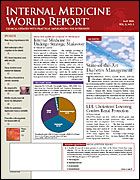Publication
Article
IBD–Colon Cancer Link Questioned
Author(s):
Persons with inflammatory bowel disease (IBD) may not be at increased risk of developing colorectal cancer (CRC), as experts have long believed. In fact, 2 new studies suggest that risk for CRC may not be increased at all.
Gastroenterology
The first population-based study of CRC in IBD specific to the United States included 692 patients with IBD from Olmsted County, Minnesota (. 2006;130:1039- 1046). Investigators compared data from this cohort with expected CRC rates based on Surveillance, Epidemiology, and End Results (SEER) data and with other population-based data.
With 10,470 person-years of follow-up, 6 of the ulcerative colitis patients had developed CRC, which was comparable to the 5.38 expected in the general population. Of these patients, 4 had either extensive colitis or pancolitis—a 2-fold increased risk for the developement of colon cancer, which was not a significant difference.
Among patients with Crohn’s disease, nearly twice as many had CRC as expected in the general population (6 vs 3.2). The duration of Crohn’s disease appeared to have no effect on CRC. However, men who were <30 years of age when they were diagnosed with Crohn’s disease had a 22-fold increased risk for CRC, although investigators point out that there was a wide confidence interval (2.7-80.3).
An actuarial analysis determined that the cumulative incidence of CRC was 0.3% at 5 years, 1.6% at 15 years, and 2.4% at 25 years after Crohn’s disease diagnosis. These figures represent a slightly increased risk compared with what would be expected based on SEER rates of 0.2% at 5 years, 0.7% at 15 years, and 1.6% at 25 years.
Gastroenterology
The second study (. 2006;130: 1030-1038) evaluated data from one hospital’s 30-year CRC surveillance program for patients with long-standing, extensive ulcerative colitis, which encompassed 600 patients, 2627 colonoscopies, and 5932 patient-years of follow-up.
Surveillance allowed 85% of the patients to avoid colectomy or segmental resection procedures. However, “although more than two thirds of patients with potentially life-threatening neoplasia benefitted from the program, even [this] relatively intensive surveillance program…uniformly applied to all patients, was not wholly effective in cancer prevention,” write Matthew D. Rutter, MD, of the University Hospital of North Tees, Stockton-on-Tees, United Kingdom, and colleagues. Advanced cancer developed in 13 patients who were under regular surveillance.
Gut
The surprising finding from this study was the lower-than-expected incidence of CRC, with rates by duration of colitis paling in comparison with those reported in previous studies of IBD, including a 2001 meta-analysis of 19 studies (. 2001;48:526-535) (Table). Even when dysplasia cases were included, although CRC rates increased, they were not as high as those in 2001.
Other notable findings were an impressive 5-year postsurgical survival rate for patients with cancer of 73.3% and a significant decrease in cancers developing proximal to the splenic flexure during the study period. Cancer incidence remained constant in patients who had colitis for up to 40 years, suggesting that surveillance need not intensify over time.
Gastro
enterology
In an accompanying editorial (, pages 1350-1352), David T. Ruben, MD, University of Chicago, noted that the “increased risk of CRC in IBD has been accepted and has therefore led to expert opinion-based prevention guidelines that emphasize screening and surveillance colonoscopic examinations.”
Dr Ruben notes that the authors of the Olmsted County study themselves speculate that these results may reflect the success of preventive efforts rather than reduced risk. “If this is indeed the case, one must not misinterpret the results to suggest a less rigorous approach to prevention…but encourage ongoing adherence to prevention guidelines, disease control, and surgery.”






